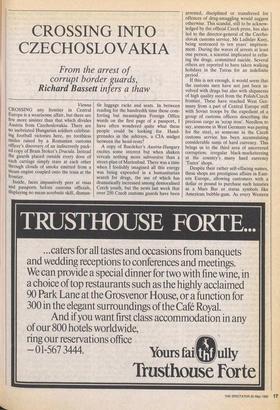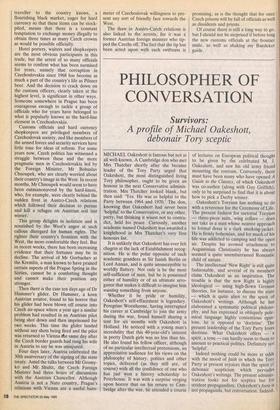CROSSING INTO CZECHOSLOVAKIA
From the arrest of corrupt border guards,
Richard Bassett infers a thaw Vienna CROSSING any frontier in Central Europe is a wearisome affair, but there are few more sinister than that which divides Austria from Czechoslovakia. There are no inebriated Hungarian soldiers celebrat- ing football victories here, no toothless smiles raised by a Romanian customs officer's discovery of an indiscreetly pack- ed copy of Bram Stoker's Dracula. Instead the guards placed outside every door of each carriage simply stare at each other through clouds of smoke emitted from a steam engine coupled onto the train at the frontier.
Inside, faces impassively peer at visas and passports before customs officials, displaying no mean acrobatic skill, disman- tle luggage racks and seats. In between reading for the hundredth time those com- forting but meaningless Foreign Office words on the first page of a passport, I have often wondered quite what these people could be looking for. Hand- grenades in the ashtrays, a CIA midget between the head-rests?
A copy of Baedeker's Austria-Hungary excites some interest but when shaken reveals nothing more subversive than a street-plan of Marienbad. There was a time when I foolishly imagined all this energy was being expended in a humanitarian search for drugs, the use of which has dramatically increased among demoralised Czech youth, but the news last week that over 250 Czech customs guards have been arrested, disciplined or transferred for offences of drug-smuggling would suggest otherwise. This scandal, still to be acknow- ledged by the official Czech press, has also led to the director-general of the Czecho- slovak customs service, Mr Ladislav Kusy, being sentenced to ten years' imprison- ment. During the waves of arrests at least one person, a scientist implicated in refin- ing the drugs, committed suicide. Several others are reported to have taken walking holidays in the Tatras for an indefinite period.
If this is not enough, it would seem that the customs men have not just been in- volved with drugs but also with shipments of high quality steel from the Polish/Czech frontier. These have reached West Ger- many from a part of Central Europe stiff with Soviet troops by the expedient of a group of customs officers describing the precious cargo as 'scrap iron'. Needless to say, someone in West Germany was paying for the steel, so someone in the Czech customs service has been accumulating considerable sums of hard currency. This brings us to the third area of uncovered corruption: irregular black-marketeering at the country's many hard currency `Tuzex' shops.
Despite their rather self-effacing names, these shops are prestigious affairs in East- ern Europe, allowing customers with a dollar or pound to purchase such luxuries as a Mars Bar or status symbols like American bubble-gum. As every Western traveller to the country knows, a flourishing black market, eager for hard currency so that these items can be stock- piled, means that there is a constant temptation to exchange money illegally to obtain three times as many Czech crowns as would be possible officially.
Hotel porters, waiters and shopkeepers are the most obvious participants in this trade, but the arrest of so many officials seems to confirm what has been surmised for years, namely that corruption in Czechoslovakia since 1968 has become as much a part of the country's life as Pilsner beer. And the decision to crack down on the customs officers, clearly taken at the highest level, is significant in other ways. Someone somewhere in Prague has been courageous enough to tackle a group of officials who for years have belonged to what is popularly known as the hard-line element in Czechoslovakia.
Customs officials and hard currency shopkeepers are privileged members of Czechoslovak society, and like members of the armed forces and security services have little time for ideas of reform. For some years now, Czech politics has witnessed a struggle between these and the more pragmatic men in Czechoslovakia led by the Foreign Minister, Mr Bohuslav Chnoupek, who are clearly worried about their country's image in the West. In recent months, Mr Chnoupek would seem to have been outmanoeuvred by the hard-liners, who, for example, were clearly behind the sudden frost in Austro-Czech relations which followed their decision to pursue and kill a refugee on Austrian soil last winter.
This group delights in isolation and is nourished by the West's anger at such callous disregard for human rights. The tighter their country's frontiers with the West, the more comfortable they feel. But in recent weeks, there has been increasing evidence that their fortunes may be in decline. The arrival of Mr Gorbachev at the Kremlin, a man known to have praised certain aspects of the Prague Spring in the Sixties, cannot be a comforting thought and cannot make their position any stronger.
Then there is the case ten days ago of Dr Hummer's glider. Dr Hummer, a keen Austrian aviator, found to his horror that his glider had been blown off course into Czech air-space where a year ago a similar problem had resulted in an Austrian pilot being shot down and then imprisoned for two weeks. This time the glider landed without any shots being fired and the pilot was returned to Vienna Ale same day after the Czech border guards had rung his wife in Austria to say he was uninjured.
Four days later, Austria celebrated the 30th anniversary of the signing of the state treaty. Amid the talks between Mr Gromy- ko and Mr Shultz, the Czech Foreign Minister had three hours of discussions with the Austrian Chancellor. Although Austria is not a Nato country, Prague's relations with Vienna are a useful baro- meter of Czechoslovak willingness to pre- sent any sort of friendly face towards the West.
The thaw in Austro-Czech relations is also linked to the arrests, for it was a former Austrian foreign minister who tip- ped the Czechs off. The fact that the tip has been acted upon with such swiftness is promising, as is the thought that for once Czech prisons will be full of officials as well as dissidents and priests.
Of course there is still a long way to go, but I should not be surprised if before long the new customs officials at the frontier smile, as well as shaking my Baedeker guide.



















































 Previous page
Previous page